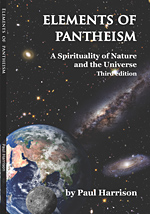As the fundamental basis of modern science, Naturalism is a very powerful paradigm. In its strong form, the central belief of Naturalism is very simple and basic:
Nature is all there is, and we are part of Nature.
Everything that we are and do is fully encompassed in Nature – there are no supernatural beings, forces or realms. There are phenomena that we do not yet understand, but that doesn’t mean they are supernatural.
Naturalism has been a philosophical movement as well as an axiom underlying the scientific method. But could there also be a naturalistic form of spirituality – focused entirely on the natural world, without belief in any supernatural beings, realms or forces? A spirituality of science, a spirituality of reason, fully compatible with science, evidence and logic?
Towards a naturalistic spirituality
Strong Naturalism is at the heart of World Pantheism’s outlook which we call Naturalistic Pantheism or Scientific Pantheism. World Pantheism offers a completely naturalistic spirituality. We direct our deepest feelings towards Nature, just as it is presented to us by our senses and explored by science. Nature alone is powerful, beautiful and mysterious enough to be the object of our deepest reverence, and Nature provides us with realistic ways of coping with stress, anxiety and bereavement.
Our forms of celebration are also completely naturalistic, focused on this life on this earth, not on supernatural realms or beings. They may involve nature hikes and appreciation of natural objects and photographs; natural sports such as surfing, skiing, mountaineering or whitewater rafting; or simply the quiet contemplation of nature. Some pantheists enjoy symbolic rituals but these are done for fun or self-expression, not because we think we can control the elements and magically manipulate natural laws.
Natural death
Part of naturalistic spirituality is an acceptance of natural death as the end of the separate individual person. The only forms of “afterlife” are natural ones such as the persistence of our creations, actions, memories and genes, and the recycling of our elements into new living forms.
Natural death also involves nature-friendly funerals, such as burials in woodlands or orchards using biodegradable materials and without embalming.
How the WPM differs from other naturalistic organizations
Most atheist and humanist organizations have a strong naturalistic point of view, and we agree with them fully on this. Like them, we have no belief in a thinking, creator or personal God. Like them we believe that humans are the source of human ethical codes.
We add to humanism and atheism a strong affirmation of this life, in these our bodies, on this our beautiful planet. This is the only life and the only paradise we will ever know, so we had better take good care of them.
We also believe that there are naturalistic ways to satisfy those needs that traditional religions target – for community, purpose, therapy, remedies for grief and fear of death.
There are organizations where Naturalism occupies a more explicit place.
The Center for Naturalism embodies the strong version of Naturalism, as does the WPM. However, the Center for Naturalism places a very strong emphasis on the denial of free will and personal responsibility.
The WPM recognizes that some strict naturalists believe in determinism. Others, equally strict, believe in free will. The WPM does not have a position on this question. Determinism is not a necessary deduction from strong Naturalism. There are eminent naturalistic thinkers who believe in free will – such as Daniel Dennett. Determinism has also been associated with theistic religions, and there have been many Christian determinists such as Luther and Calvin and even St Paul.
The Religious Naturalism email lists at Yahoo and the Institute for Religion in an Age of Science (IRAS) operate with the weak version of Naturalism – in which the natural world is considered as being ruled by natural law, but without excluding the possibility that there is a creator deity. Catering for theists as well as atheists, the Religious Naturalist lists allow for “traditional religious beliefs that nature itself rests in ultimacy and is the object of divine concern.” In other words, Religious Naturalism (at least as practiced in the two main forums with that title) can embrace Panentheism and Deism as well as Pantheism.
It’s also possible to conceive of a different approach to Religious Naturalism – one that follows the strong version of Naturalism. The WPM’s Naturalistic Pantheism can be considered as the most explicit home for that tendency.
At the WPM we consider a personal, creator or thinking God as a supernatural idea, incompatible with strong Naturalism. Indeed a creator God is the most supernatural entity one could possibly conceive of. Even if this God disappears after the moment of creation, leaving Nature to proceed by natural laws (as Deism believes), it’s still the supernatural first cause of everything that exists.
About one third of WPM members and friends use the word God – but they use it to denote their own deep feelings of reverence towards Nature and the wider Universe, not to indicate belief in anything supernatural.

